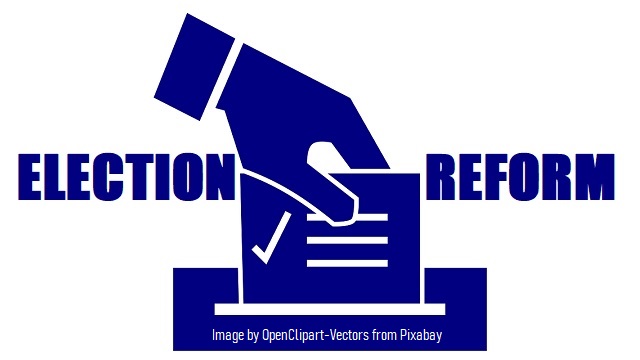ELECTION REFORM: Efforts underway in key battleground states to return voting systems to pre-2020 rules

It’s the only thing that matters – without election reform, the nation is finished.
President Trump discussed this in his speech at CPAC. The Democrats were able to use the COVID-19 pandemic to change the voting laws in a number of swing states. This resulted in massive levels of mail-in voting, expanded early voting, relaxation of verification rules, and extensions to ballot receipt deadlines. The Republican Party must ensure that the state legislators return the voting systems to pre-2020 rules. If not, it will be next to impossible for the Republican Party to win future national elections. Election integrity should be the number 1 priority for Team Trump.
Efforts underway in key battleground states to return voting systems to pre-2020 rules
By Just the News, March 1, 2021:
Legislators looking to roll back major changes to mail-in voting, early voter lists.
Significant legislative attempts are underway in multiple U.S. states, including key battleground states, to roll back major changes in voting rules and regulations to various pre-2020 status quo antes. The efforts come after an historically chaotic election process that has left millions of Americans doubtful of election fairness, security, transparency and accountability.
Changes to election rules — some of them enacted prior to 2020 and others put in place in response to the COVID-19 pandemic last year — have included expansive mail-in voting, expanded early voting, relaxation of verification rules, and extensions to ballot receipt deadlines.
Those rules likely contributed to a record 158,000,000-plus votes cast in the 2020 election. But the relaxation of various voting requirements has also led to significant distrust in the election system: Nearly 40% of voters believe that U.S. elections are beset by fraud, while a similar number claim that such concerns haven’t been properly vetted by public authorities.
Georgia, Pennsylvania, Arizona all considering bills to roll back rule changes
Legislators in numerous states are angling to address some of those concerns by pushing for legislation to shore up what critics claim are the vulnerabilities created by relaxed voting rules.
In Georgia — which flipped blue for Biden this year in one of several razor-thin races that went in the Democrat’s favor — the Senate passed a bill that would require voters to submit “photocopies of voter identification documents for absentee ballot applications.”
The bill would do away with the current signature-matching system currently in place for absentee voting. Critics have accused that system of being ripe for fraud and abuse, particularly after the state’s Gov. Brian Kemp agreed to activist demands last year to make it much more onerous for officials to reject disputed signatures.
In Pennsylvania — which Trump lost by fewer than 100,000 votes — state lawmakers have signaled an intent to repeal the state’s “no-excuse” mail-in voting system, first implemented in 2019.
State Sens. Patrick Stefano and Doug Mastriano last month said in a Senate memorandum that they “intend to introduce legislation repealing the no-excuse mail-in ballot provisions” put in place two years ago via the state’s Act 77.
“By removing the provisions of law that allow for no-excuse mail-in ballots, we can regain some trust in our elections’ integrity,” the senators argued.
RELATED ARTICLE: “Outraged” Democrats Protest Election Integrity in Georgia, Clash With Police
EDITORS NOTE: This Geller Report column is republished with permission. ©All rights reserved. Quick note: Tech giants are snuffing us out. You know this. Twitter, LinkedIn, Google Adsense permenently banned us. Facebook, Twitter, Google search et al have shadowbanned, suspended and deleted us from your news feeds. They are disappearing us. But we are here. Help us fight. Subscribe to Geller Report newsletter here — it’s free and it’s critical NOW more than ever. Share our posts on social and with your email contacts.


Leave a Reply
Want to join the discussion?Feel free to contribute!